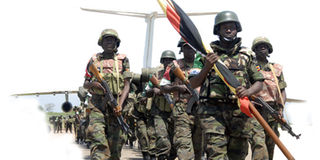Uganda pulling out of Somalia, says Amama

The government has resolved to withdraw all UPDF troops in Somalia and other peace keeping missions in Africa and send the soldiers to protect Uganda’s western border with DRC, Premier Amama Mbabazi told Parliament on Thursday night.
The Prime minister made the statement while reading a response to the Leader of Opposition’s question on how Uganda is handling the Congo question in respect to the leaked UN report that Uganda was aiding the M23 rebels in the Democratic republic of Congo.
Mr Mbabazi said that Uganda has sent ICT minister Ruhakana Rugunda to the UN with a protest letter dismissing what he termed as “a UN amateurs report” on Uganda’s involvement in the DR Congo and failure by the western powers to recognise Uganda’s contribution to peace in the region.
It is in the letter that Uganda said it will withdraw from all peacekeeping missions to protect itself from possible invasion from Congo and UN sponsored terrorists.
“Why should we continue involving Uganda where the only reward we get is malignment? Why should the children of Ugandans die and we get malignment as a reward? Why should we invite retaliation by the al-shabaab by standing with the people of Somalia, only to get malignment by the UN system?” he asked.
“Since there are actors in the UN who are not able to understand that there can be principled actors in Africa and who think that all actors are looking for minerals like the imperialists did, we have now decided, after due consultations with our African brothers in the AU and ICGLR, to completely withdraw from regional peace efforts,” Mr Mbabazi said.
In the said leaked report, the UN Group of Experts on DRC accuses Uganda of supporting M23 in the form of direct troop reinforcement in DRC territory, weapon deliveries, technical assistance, joint planning, political advice and facilitation of external relations. They also claim that units of the UPDF and the Rwanda Defence Forces jointly supported M23 in a series of attacks in July, 2012 to take over major towns of Rutshuru territory.
The surprise
However, Mr Mbabazi said Uganda doesn’t believe in the findings of the “so called experts” because Uganda’s security officials were never interviewed. “The government of Uganda was surprised that the issues, which were neither notified to Uganda prior to the visit nor discussed in the meeting of September 18, 2012 formed the subject of the report,” he said. “It was even more surprising that the UN Security Council on receiving this report simply endorsed it in total and even pronounced itself on possible sanctions against Uganda without any reference to us.”
In the response, Mr Mbabazi said in order to persuade Uganda to change its decision to withdraw from all peace missions and deploy on the Congo border, the UN must say the truth about Ugandan’s role in the regional peace efforts.
“We would only want to remind the UN about the rights of the people of Uganda which are the only reason we have been keenly spearheading the regional efforts to find a lasting solution to the insecurity in Eastern Congo,” he said.
“It is not in order for DRC in partnership with Monusco, to maintain terrorists against Uganda by allowing ADF to freely use DRC territory to train, receive arms and to a lunch assassination attacks on Ugandans.”
The MPs did not debate Mr Mbabazi’s statement, citing the sensitivity of the matters raised therein. “The tone of the letter [to the UN] as read by the Prime minister indicates that Uganda is actually angry and ready to go to war,” said Mr Vincent Kyamadidi [NRM, Rwampara]. “We need time to discuss issues raised.”
The matter comes back to the House on Tuesday.



